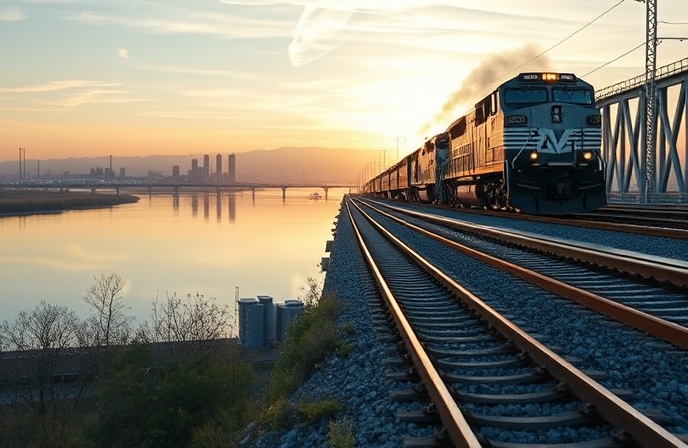Netherlands-Belgium Rail: Doubled Daily Trains

This article explores the significant expansion of high-speed rail services between the Netherlands and Belgium, focusing on the doubling of daily intercity train connections between Brussels and various Dutch cities. The initiative, spearheaded by the Belgian national railway operator SNCB (Belgian National Railway Company) and the Dutch operator NS (Nederlandse Spoorwegen), represents a considerable investment in cross-border rail infrastructure and signifies a commitment to enhancing international connectivity and promoting sustainable transportation. The expansion utilizes the new Intercity Next Generation (ICNG) trains, featuring advanced technology and passenger-centric design. This modernization project promises improved travel times, increased capacity, and enhanced passenger comfort, ultimately transforming the cross-border travel experience. The strategic implications for both countries, in terms of economic growth, tourism, and environmental sustainability, will also be examined.
Increased Cross-Border Connectivity
The core of this initiative is the dramatic increase in daily intercity train services between the Netherlands and Belgium. SNCB plans to double the number of daily services connecting Brussels and the Netherlands, from 16 to 32 by December 2024. This significant expansion is made possible through the introduction of the new ICNG trains, which offer increased capacity and improved operational efficiency. The added frequency aims to meet the growing demand for cross-border rail travel, making this mode of transport a more convenient and attractive option compared to other modes of transportation.
Modernization with ICNG Trains
The implementation of the Intercity Next Generation (ICNG) trains is a critical component of this service expansion. These modern trains are designed to enhance passenger experience and operational efficiency. Their features include spacious and well-lit interiors, improved accessibility, and higher passenger capacity (413 passengers per train). The ICNG trains are also equipped with advanced technologies to improve punctuality and reliability, contributing to a smoother and more comfortable travel experience. The use of these new trains reflects a commitment to modernizing rail infrastructure and providing passengers with a state-of-the-art transportation solution. This commitment also implies investment in high-speed rail infrastructure, allowing the trains to reach speeds up to 200 km/h. The result will be reduced journey times and a generally more efficient service.
Strategic Route Optimization
Beyond simply increasing the number of services, this expansion includes strategic route optimization. A new direct route connecting Rotterdam Central to Brussels via Breda, operating 16 times daily, has been added. This route offers a significant advantage for passengers traveling to and from Brussels Airport. Further, the new services will commence from Amsterdam Zuid (South), reducing the number of intermediate stops. This will enhance travel speed, creating a significantly faster and more efficient journey. These routing adjustments are designed to optimize travel times and access to key destinations, better catering to passenger needs and maximizing the efficiency of the rail network.
Sustainability and Economic Impact
The expansion of cross-border rail services is presented not only as an improvement in convenience and speed but also as a significant step towards sustainable transportation. The NS CEO highlights the role rail travel plays in mitigating climate change, emphasizing the importance of making sustainable choices accessible and attractive to commuters. The increased accessibility through this initiative will contribute to a reduction in reliance on private vehicles and air travel for cross-border journeys. The economic benefits are also significant, with the anticipated increase in passenger numbers expected to generate substantial revenue for both railway operators and the wider economy. The enhanced connectivity will also boost tourism and improve trade relations between the Netherlands and Belgium.
Conclusions
The doubling of daily intercity train services between the Netherlands and Belgium represents a significant advancement in cross-border rail transport. The initiative, driven by SNCB and NS, successfully combines increased service frequency with the introduction of the modern ICNG trains. This modernization effort focuses on providing a superior passenger experience through enhanced speed, capacity, and comfort. The strategic route optimization, with the addition of the Rotterdam Central to Brussels via Breda route, further enhances the efficiency and convenience of the service. By significantly increasing service frequency from 16 to 32 daily trains, the project seeks to meet the growing demand for cross-border rail travel. The reduced travel time, which can be up to 45 minutes shorter, also significantly boosts the appeal of train travel over alternative modes of transport.
Beyond the immediate improvements in passenger experience, the project makes a substantial contribution to sustainable transportation. By promoting rail travel as an environmentally friendly alternative to air travel and private vehicles, it encourages a shift towards greener modes of transport. This is vital in combating climate change and moving toward a more sustainable future. The economic benefits are equally substantial, boosting tourism, trade, and revenue generation for both railway operators and the broader economies of the Netherlands and Belgium. This expansion marks a significant milestone in international rail connectivity and sets a strong precedent for similar cross-border improvements across Europe and beyond.
In conclusion, the initiative to increase cross-border rail services between the Netherlands and Belgium is a significant success, demonstrating the effectiveness of strategic investment in modern rail infrastructure and operational efficiency. This strategic decision promotes sustainability, boosts economies, and improves the overall passenger experience, marking a key step forward in European rail travel. The success of this project should serve as a model for other cross-border rail initiatives worldwide, showcasing the potential for significant environmental, economic, and social benefits.



